June 19, 2025 | 05:20 GMT +7
June 19, 2025 | 05:20 GMT +7
Hotline: 0913.378.918
June 19, 2025 | 05:20 GMT +7
Hotline: 0913.378.918
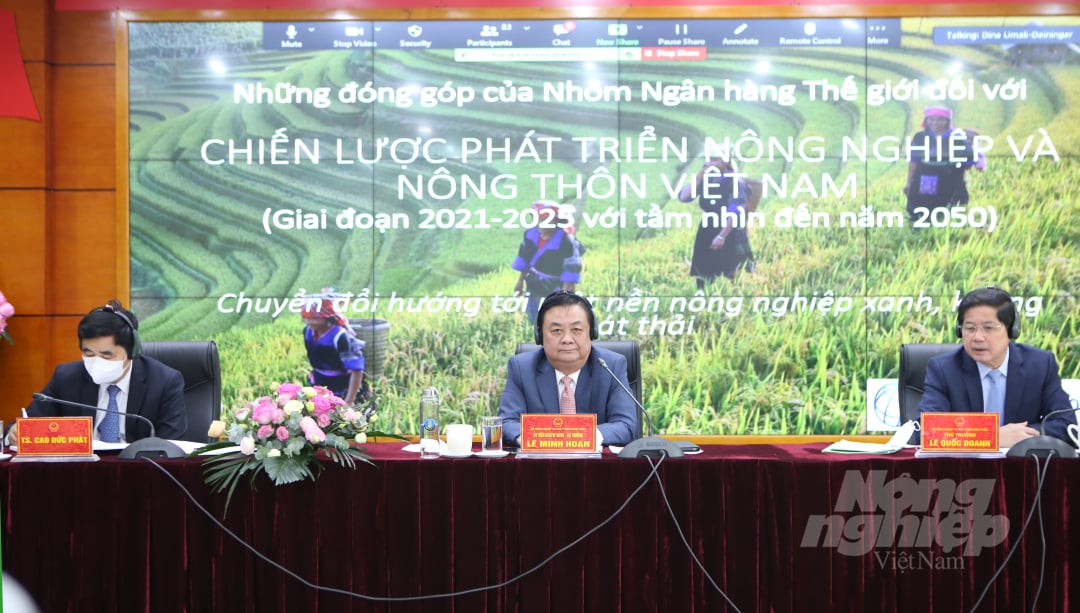
Minister Le Minh Hoan (centre) and former Minister of Agriculture and Rural Development Cao Duc Phat (left) and Deputy Minister Le Quoc Doanh chaired a consultation meeting between the MARD and international partners. Photo: Minh Phuc.
Minister Le Minh Hoan shared that the process of restructuring Vietnam's agriculture has been going on for many years and has achieved very positive results.
However, in order for the agricultural sector to truly become an important "support pillar" of the economy, a national image, and ensure sustainable development in the future, many different approaches are required.
"In the next period, the restructuring of the agricultural sector is not only about expanding this industry or narrowing others. It’s about integrating values that have both local and global values; moving from a single-sector development mindset to a multi-sectoral and multi-valued integrated approach. The agricultural economy includes the knowledge economy - the future economy that we live in, not just the normal classical economy", Minister Le Minh Hoan further explained.
From a research project on rice farming in Dong Thap, Minister Le Minh Hoan found that Vietnam's food production not only causes greenhouse gas emissions but also has high production costs. It is also a problem that international organizations are very interested in solving, by which building responsible agriculture.
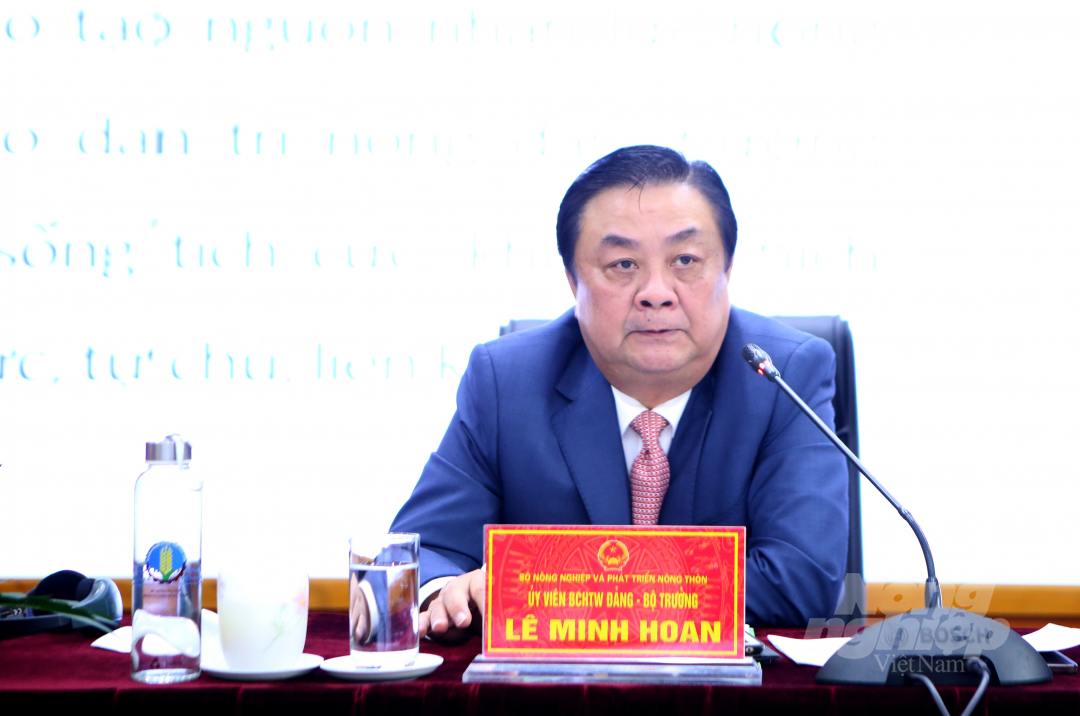
Minister of Agriculture and Rural Development Le Minh Hoan. Photo: Minh Phuc.
Additionally, according to Minister Le Minh Hoan, in order to do that, the agricultural industry must follow the trend of circular economy, making use of agricultural waste and by-products, creating more jobs in the countryside through creativity and development of new products; building a rural economic ecosystem…
This will serve as a testament to the commitment of the Government of Vietnam to the world for sustainable development based on three pillars: socio - economic - environmental.
The MARD head said that through the community agricultural extension project, as well as training and education activities, Vietnamese farmers and consumers will gradually raise their awareness.
Minister Le Minh Hoan also emphasized the focus on developing the rural economic space. In that space, farmers not only produce pure agriculture, but we also have to reorganize rural life, rural communities, form cooperatives with strong governance capacity to lead the value chain of small industries to start creating more jobs in rural areas; there are also small and medium enterprises, agricultural start-ups... to integrate the values of agricultural products.
“Although the export value of Vietnam's agricultural products has continuously grown in recent years and is now about USD 42 billion/year, I’m very concerned because the contribution of TFP to growth is decreasing because farmers use a lot of fertilizers, pesticides... in production”, stated Ms. Dina Umali-Deininger, Director of Agriculture for East Asia and Pacific Region of the World Bank (WB).
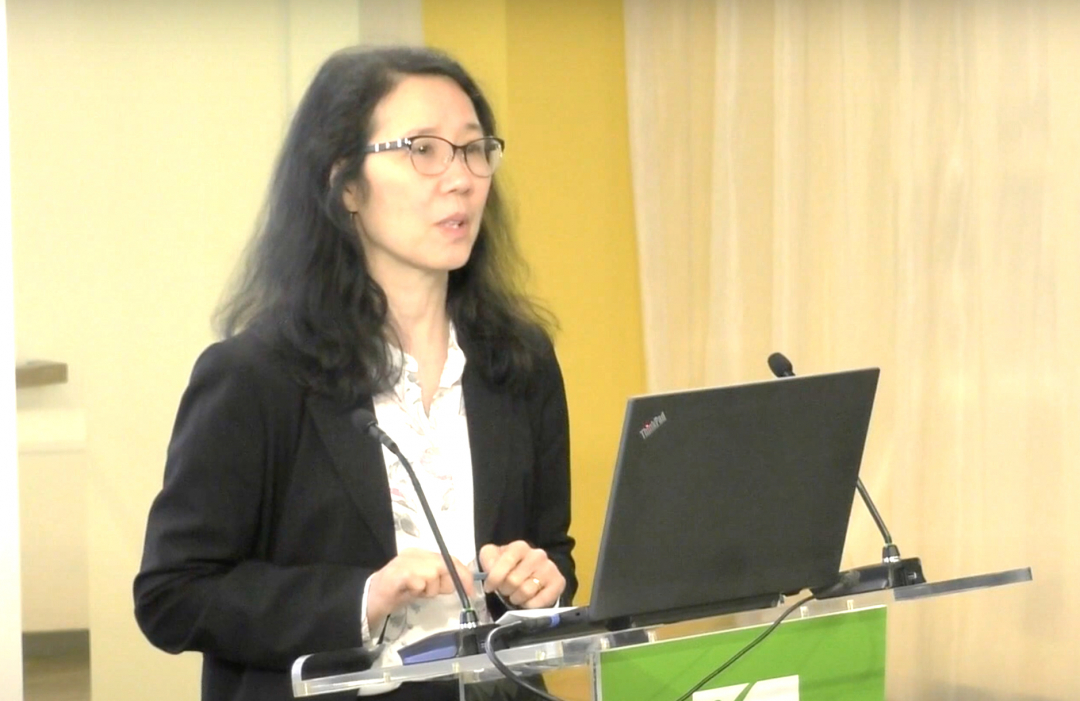
Ms. Dina Umali-Deininger, Director of Agriculture for East Asia and Pacific Region of the World Bank (WB).
In Ms. Dina’s opinion, Vietnam needs to identify resources to promote the rapid growth of the agricultural industry, which are technology, digital transformation, water efficiency improvement, establishment of product labels, repositioning the value of agricultural products in regional and international markets.
Vietnam needs to focus on “greening” in farming activities of rice and important crops. Therefore, it is essential to manage inputs more scientifically, apply advanced farming techniques such as "one right five reduce" (1P5G), improve rice straw treatment, switch from rice monoculture to rice intelligent production, adaptive to climate change, pay more attention to the carbon market because Vietnam still has room to reduce greenhouse gas emissions. With production models applying green technology, Vietnamese products can also have the opportunity to increase their value.
Mr. Okabe Daisuke, Ambassador of the Japanese Embassy in Vietnam claims that Vietnam’s orientation of sustainable, responsible agriculture and green transformation is similar to Japan's food development strategy. Japan and Vietnam have had cooperation programs in the agricultural sector, and have also had positive activities to promote the application of new and advanced technologies, and develop Vietnam’s agricultural human resources through Japan's Ministry of Agriculture, Forestry and Fisheries as well as the JICA Partnership Program.
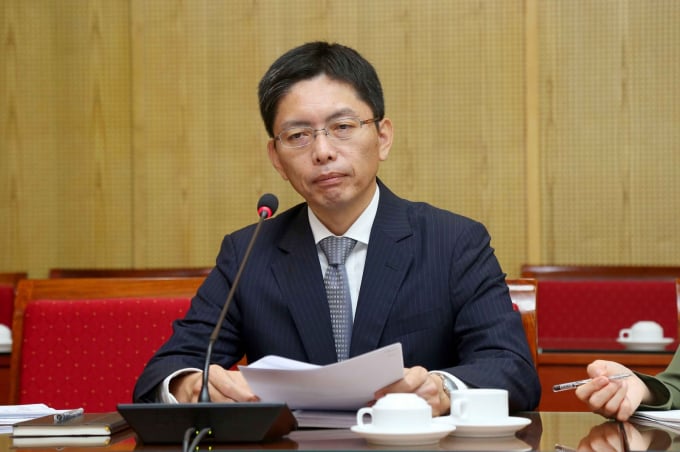
Mr. Okabe Daisuke, Ambassador of the Japanese Embassy in Vietnam.
“Vietnam is very vulnerable to the impacts of climate change. Therefore, in order to achieve sustainable agricultural and rural development, it is necessary to promote effective leadership, management, and cooperation of stakeholders. In addition, innovation, creativity and technology will be the keys to the mentioned goal”, stated Mr. Robert Hanson, Agricultural Counselor of the US Embassy in Vietnam.
Over the past time, the United States Department of Agriculture (USDA) has coordinated with agencies, departments and sectors of Vietnam to support issues related to the development of production infrastructure, application of new technologies, and smart farming solutions, typically the cooperation between USDA and Vietnamese experts in developing ASF vaccine, overcoming the consequences of the disease…
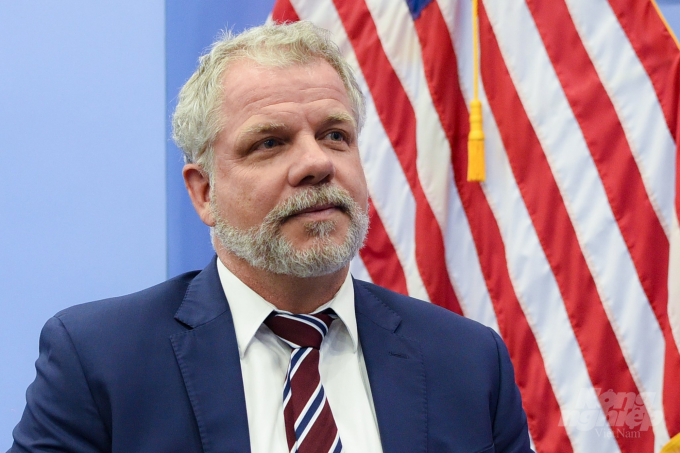
Mr. Robert Hanson, Agricultural Counselor of the US Embassy in Vietnam. Photo: Tung Dinh.
Translated by Samuel Pham

(VAN) To address plastic pollution, closing the plastic recycling cycle will bring significant economic and environmental benefits.

(VAN) According to the Binh Thuan Department of Industry and Trade, in the first five months of 2025, Binh Thuan's dragon fruit export turnover increased by 20.65% compared to the same period last year.

(VAN) EU countries on Thursday gave final approval to new tariffs on fertilizer imports from Russia, a move aimed at cutting off revenue that could support Moscow’s war in Ukraine, despite concerns from European farmers.

(VAN) The working delegation from the Ministry of Agriculture and Environment conducted an important trip to the Netherlands to strengthen strategic partnerships and sustainable development in the agricultural sector.

(VAN) The letter ‘A Plea from the Ocean’ not only evokes emotion but also awakens the human conscience to the responsibility of protecting life on Earth.

(VAN) The Department of Agriculture in South Africa has announced the country’s first mass vaccination of poultry to prevent local birds from contracting avian influenza.

(VAN) Establishment of the Mekong Delta Regional Agricultural Linkage Center, aiming for a closed value chain, deep processing, trading platforms, and international market connectivity.